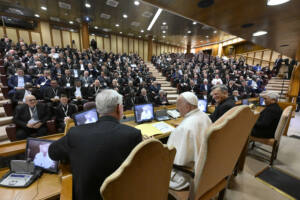
WelCom, September 2024
Around the world, bishops together with the Catholic faithful of their dioceses in Europe, Asia, Latin America, and Africa have been gearing up for the second session of the 2021–2024 Synod on Synodality to take place 2–27 October in Vatican City.
The worldwide process launched by Pope Francis for the Catholic Church is centred on the theological concept of ‘synodality’ or ‘journeying together’ as the People of God. Synodality places particular emphasis on renewing the call of each baptised person to actively participate in the mission Jesus Christ entrusted to his church.
As part of this global process of listening, dialogue, and discernment, regional bishops’ conferences – in collaboration with clergy, religious men and women, and laypeople – have spearheaded continental-wide workshops to discuss key theological and pastoral considerations raised in the Instrumentum Laboris, the Vatican’s working document for the second and last global session of the Synod on Synodality, released on 9 July.
In Europe 42 representatives from local churches across Europe were divided into small focus groups at a conference from 29–31 August in Linz, Austria, to discuss the themes outlined in the Vatican’s working document for the second session of the Synod.
Members of the Council of the Bishops’ Conferences of Europe (CCEE), including the presidents of the bishops’ conferences of Italy, Austria, and Switzerland, attended the three-day meeting, together with European experts in theology and canon law as well as Vatican representatives.
In Asia, the Federation of Asian Bishops’ Conferences (FABC) held its regional workshop from 5–8 August in Bangkok and identified the necessity for unity and harmony for the growth of the Catholic Church in a largely non-Christian region. The meeting was attended by 38 delegates from local churches spread across 17 countries.
In association with its social communications office, the FABC have recently launched the ‘Synodality Asia’ [synodalityasia.net] website to engage the Catholic faithful to engage with the synodal path of Asia.
In South America, the Episcopal Council of Latin America and the Caribbean (CELAM) held a three-day congress in Bogota, Colombia, attended by nearly 2,000 people. Approximately 200 people attended workshops in person while an additional 1,200 people participated online in the 9–11 August congress to discuss topics including church structures, the role of women, and the meaning of mission.
Prior to the release of the Instrumentum Laboris, the Symposium of Episcopal Conferences of Africa and Madagascar (SECAM) together with the African Synodal Initiative (ASI), convened a two-day meeting in Nairobi, Kenya in April.
Fifty delegates from local churches came together to explore the ways and means of being ‘a synodal church in mission’ and discussed the unique experience and distinct contribution of the peoples of Africa in the evangelisation of the continent.
Cardinal Fridolin Ambongo, president of SECAM and archbishop of Kinshasa, said the meeting recognised the importance of fortifying the Christian identity in the region and the need to the integrate the distinct cultural and community forces into the broader mission of the Church.
The 2–27 October meeting to be held in the Vatican with Pope Francis will close the discernment phase of the Synod on Synodality. The conclusions of both the 2023 and 2024 global sessions – as accepted and approved by the Pope – are then expected to be implemented in all local churches with the purpose of creating a listening and more participative Catholic Church worldwide.
Source: CNA